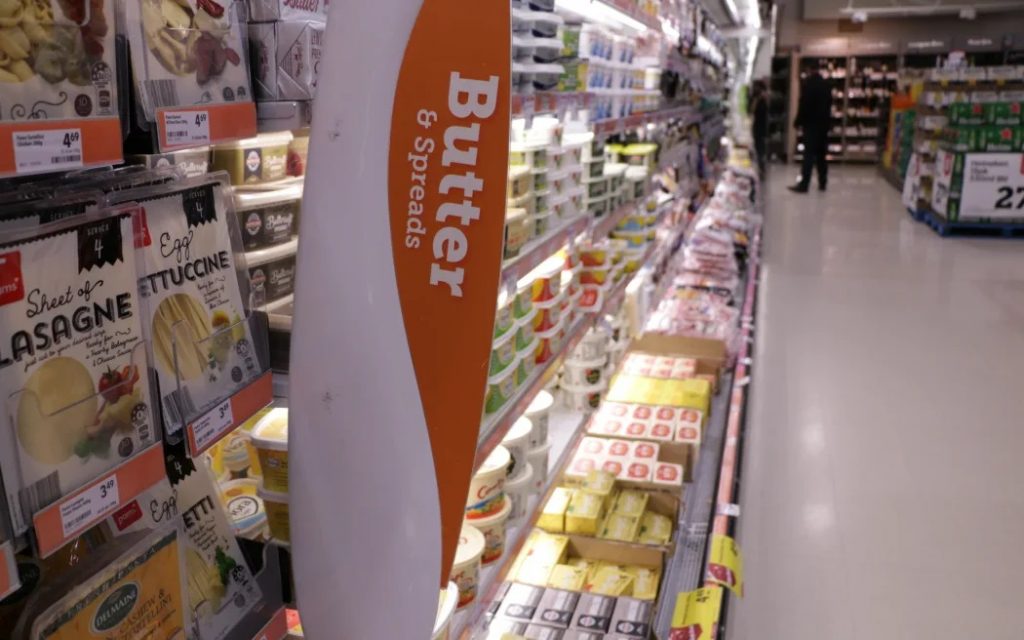
Whether you spread it on your toast, drop a dollop into the frying pan or use it for baking, butter is considered a must-have in the pantry for many of us.
But some shoppers in South Auckland are going without it and other dairy products because they are simply too expensive.
In some suburbs, a 500g block of Anchor butter is hovering near or above the $10 mark at some Pak’nSave supermarkets.
But there is a massive discrepancy between different suburbs in Tāmaki Makaurau, with some in lower socio-economic areas paying the higher price.
It was pricier for shoppers in only some suburbs like at Pak’nSave in Māngere, where a 500g slab of Anchor butter was selling for $10.39 on Monday night. That price has come down to $7.99.
But at Manukau Pak’nSave a block was $8.49, and at the Lincoln Road Pak’nSave, it was $9.99.
Auckland shoppers told RNZ it was too much.
“I would not pay $10 for butter, I would stick to margarine,” said one shopper.
Another said she was avoiding dairy products due to their price and that butter should not cost more than $5.
At Pak’nSave Glen Innes, 15km away from Manukau, a 500g block was over $2 cheaper at $6.29.
Shoppers said they felt like supermarkets were ripping them off.
“I do realise that when I go to other suburbs to do shopping the prices are so different, it’s not fair at all.”
One shopper said she was confused why there was a price difference. “If I had known it was cheaper elsewhere, I probably would have used up all my gas and went all the way there.”
At the Mint Cakery in Ellerslie, Auckland baker Tenneille said the price of a 500g block of butter had doubled over the past year.
“The other day we went to go and buy some and it went from $7.50 a block to $10 a block, which means it’s $200 for a box of butter.”
That is 20 blocks of butter in one box, and the cake shop often goes through the whole lot in one day.
“We make big batches of buttercream, and it uses five blocks just for one batch and we go through that pretty quickly,” Tenneille said.
Baker Tenneille at Mint Cakery in Ellerslie, Auckland. Photo: RNZ / Louise Ternouth
At the moment, they sourced their butter from Gilmore’s but they were trying to shop around for a cheaper block.
The cake shop was trying to avoid having to put their prices up, but it had become difficult to make a profit with most ingredients costing so much, Tenneille said.
“It’s not just butter, it is everything, I think eggs have doubled as well.
“It’s small family-owned businesses that are being affected, it’s not these big companies or chains, it’s people with families, it’s people that have to put food on the table, those are the people that are getting affected because of this.”
Consumer NZ research and advocacy head Gemma Rasmussen told Checkpoint there was huge price variability with Foodstuffs across the board.
“So, if we’re talking about this Anchor 500g butter, the highest that we could find it in the country was $11.49 versus the low of $6.19.”
Rasmussen said supermarkets considered factors like age and income of people working in a suburb when they set their prices.
“In a suburb like Māngere, that is, you know, more lower socioeconomic area, there’s three supermarkets there.
“The reality for a lot of people in that area is that they may not have a car, and we know having spoken to people working in budgeting services in Māngere, there’s a really high level of distrust with that supermarket.”
When asked what more was needed to make the market fair, Rasmussen pointed to the fact it had been two years since the market study by the Commerce Commission looking into supermarkets.
“We are apparently going to be getting a report in the next month or so, which should give an indication as to whether we’re still looking at excessive profits.”
Rasmussen said if things had not improved off the back of the report, the government needed to intervene.
“We can’t keep dragging our heels on such an important issue.”
In a statement provided to Checkpoint, a Foodstuffs spokesperson said their butter prices were driven by the market and wholesale pricing from suppliers.
“In the last quarter, global commodity costs for butter in the Global Dairy Trade were up by more than 30 percent, impacting the price of what we’re seeing on our store shelves.”
The spokesperson said they were continually working with suppliers to get the best deals possible so they could pass on any savings to customers.
“The latest Food Price Index results from Statistics New Zealand show that Foodstuffs grocery co-ops have recorded an average rate of food price inflation that’s under 1 percent per annum for the fourth month in a row, showing our co-ops’ continued efforts to fight inflation and deliver low prices for our customers.”
You can now read the most important #news on #eDairyNews #Whatsapp channels!!!
🇺🇸 eDairy News INGLÊS: https://whatsapp.com/channel/0029VaKsjzGDTkJyIN6hcP1K


























